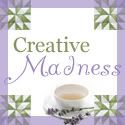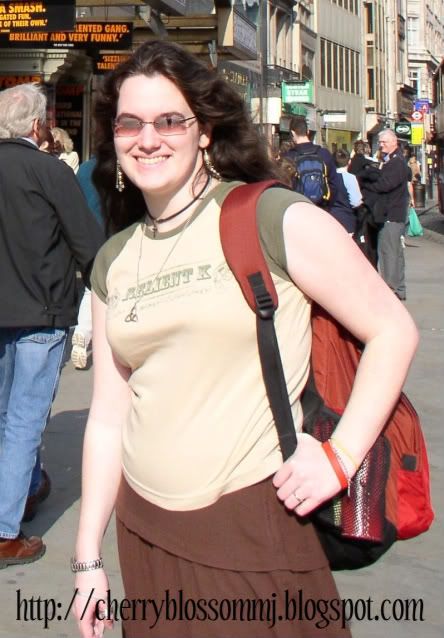Today is a special day. It's a Wild Card Tour for Once Blind: The Life of John Newton by Kay Marshall Strom. John Newton is the guy who wrote the words to "Amazing Grace". Here today I'm going to share with you the following:
- My review and thoughts
- Longer-than-a-blurb biography of Kay Strom
- Q&A with Kay
- Press Release for Once Blind
- The first chapter
 Once Blind: The Life of John Newton by Kay Marshall Strom
Once Blind: The Life of John Newton by Kay Marshall StromMy review
rating: 5 of 5 stars
John Newton's life makes a very strong testimony. Reading this biography of his life is a great addition to my library and knowledge base. Since I was a child, I can remember knowing that he was the man who was a captain on a slave ship until he found peace with Christ and wrote the lyrics to the beloved hymn "Amazing Grace". I did not however realize what all that he had endured in his life and just how "bad" he really had been. I guess I only received the child edited version of his life before. This book is told from practically a diary fashion and really takes the reader through the days and years of John's life, the good, and the very bad. In comparison to me, John is extremely strong and I would have given up early on. Comparing him to Job (Biblical Job), he still had not lost everything, but to him I'm sure it seemed he had. Reading through John Newton's life was really a personal and eye awakening experience, not just for the purpose of slave-trade, but for the purpose of being a Prodigal Child of Christ and how many times you can run, but never hide. Our God is an amazing God, and so many times we just do not see. We have all been and most of the time are just blind.
I do give this book my full recommendation. I also suggest the film "Amazing Grace". This would be perfect would a group or individual study as well as a wonderful homeschooling piece.
View all my reviews.
And now, the FIRST Wild Card Blog Tour...

It is time to play a Wild Card! Every now and then, a book that I have chosen to read is going to pop up as a FIRST Wild Card Tour. Get dealt into the game! (Just click the button!) Wild Card Tours feature an author and his/her book's FIRST chapter!
You never know when I might play a wild card on you!
Today's Wild Card author is:
and her book:
Authentic (January 2, 2008)
ABOUT THE AUTHOR:

Born and raised in San Francisco, Kay was nurtured into a zealous and godly young lady by Christian parents. At age fifteen, when she realized her family would be financially unable to fund further education, she made the commitment to work hard and frugally save to secure her dream of attending college. In 1965, she received a B.A. in literature and education from Westmont College in Santa Barbara, then she immediately went to work teaching elementary school. In 1980, when her first book was published, a new and extensive career was launched—one as an author, public speaker, and writing teacher in the California University system.
A natural-born communicator, Kay developed a love of writing and speaking as a young girl. Today, she is the author of 34 books, including Daughters of Hope, The Caregivers Survival Guide, The Savvy Couple’s Guide to Marrying After 35, and Once Blind: The Life of John Newton. Her work has appeared in many compilations, including various books from the Stories for the Heart series, and around the world in many languages.
Kay’s writing credits also include numerous magazine articles, short stories, two prize-winning screenplays, books and stories for children, and booklets for writers. Her writing has appeared in several volumes including More Than Conquerors, Amazing Love, The NIV Couple’s Devotional Bible, The NIV Women’s Devotional Bible, and The Bible for Today’s Christian Woman. Kay has recently completed the scripts for two movies, is at work on a historical novel trilogy, and is under contract for a biography on a man who is changing the face of India.
An articulate, personable, and dynamic speaker, Kay also speaks at seminars, retreats, writer’s conferences, and special events throughout the country. Whether it’s at a university lecture hall, a women’s retreat in the mountains, or a South Korean church of more than a thousand men and women, Kay looks upon a speaking engagement as an opportunity to have purposeful fun. She especially enjoys conducting marriage workshops with her husband, Dan Kline.
Recently, Kay’s writing and speaking are drawing her to countries and cultures around the world, including India, China, Indonesia, Sudan, Morocco, and Senegal. With tape recorder and camera in hand, Kay prepares to tell “the rest of the story” of our brothers and sisters around the world and how our actions impact their lives and the work of God’s Kingdom on earth.
In her free time, Kay loves reading, traveling, and walking on the beach. She and Dan make their home in Santa Barbara, California.
A natural-born communicator, Kay developed a love of writing and speaking as a young girl. Today, she is the author of 34 books, including Daughters of Hope, The Caregivers Survival Guide, The Savvy Couple’s Guide to Marrying After 35, and Once Blind: The Life of John Newton. Her work has appeared in many compilations, including various books from the Stories for the Heart series, and around the world in many languages.
Kay’s writing credits also include numerous magazine articles, short stories, two prize-winning screenplays, books and stories for children, and booklets for writers. Her writing has appeared in several volumes including More Than Conquerors, Amazing Love, The NIV Couple’s Devotional Bible, The NIV Women’s Devotional Bible, and The Bible for Today’s Christian Woman. Kay has recently completed the scripts for two movies, is at work on a historical novel trilogy, and is under contract for a biography on a man who is changing the face of India.
An articulate, personable, and dynamic speaker, Kay also speaks at seminars, retreats, writer’s conferences, and special events throughout the country. Whether it’s at a university lecture hall, a women’s retreat in the mountains, or a South Korean church of more than a thousand men and women, Kay looks upon a speaking engagement as an opportunity to have purposeful fun. She especially enjoys conducting marriage workshops with her husband, Dan Kline.
Recently, Kay’s writing and speaking are drawing her to countries and cultures around the world, including India, China, Indonesia, Sudan, Morocco, and Senegal. With tape recorder and camera in hand, Kay prepares to tell “the rest of the story” of our brothers and sisters around the world and how our actions impact their lives and the work of God’s Kingdom on earth.
In her free time, Kay loves reading, traveling, and walking on the beach. She and Dan make their home in Santa Barbara, California.
Visit her at her website.
Product Details
List Price: $14.99
Paperback: 256 pages
Publisher: Authentic (January 2, 2008)
Language: English
ISBN-10: 1934068276
ISBN-13: 978-1934068274
Q&A for Kay Marshall Strom,
Author of Once Blind
1. What is special to you personally about Once Blind (in comparison with the many other books you have written)? What connection do you have to this subject?
My first introduction to John Newton’s story was in church, told by the worship leader as we prepared to sing “Amazing Grace.” The story so moved me that I made it the subject of my second book—a chapter book for children entitled John Newton: The Angry Sailor. That book stayed in print for over twenty years, went through numerous printings, and was translated into many languages. I was invited to tell John’s story at many venues, from school groups to a Christmas event that drew 1,200 women. I was even invited to South Korea to share his powerful story and, when I finished, the entire congregation stood up and spontaneously broke out singing “Amazing Grace” in Korean! Over the years, I have come to think of John Newton as a personal friend, and to take his admonishments to heart. Now, more and more of my writing is taking me to places where I see firsthand the harsh realities of modern-day slavery with all its awful faces.
2. Why did you decide to write Once Blind in narrative form?
I believe that the story is more immediate, compelling, and powerful told this way. Surely this is why John Newton used it to effectively illustrate his message of God’s amazing grace to the listeners of his day. And the crowds who came to hear his exciting story ended up turning to Christ. It was John’s story that helped turn the heart of his nation against the slave trade.
3. What kind of research did you conduct in order to write the book?
Most of the research was based on John Newton’s own writings—his biography, his collections of letters, his treatises on the slave trade. I also used the writings of others, such as Josiah Bull, who had access to people who knew him and to his unpublished writings.
4. How much of your story is true?
Basically, the book is true, although I did employ some literary license. Although John Newton recorded his motives and actions, and certainly his opinions, he was light on specifics, names, and details. So when I was unable to find these from other sources, or when the sources were contradictory, I supplied details and situations that realistically fit the time and place, yet which enabled readers to get the full impact of what was happening. For instance, Mick Bass was not factual, but his was a fairly common situation aboard such ships at the time, and what happened there allows us to see the actions John Newton describes as his own. A great deal of John Newton’s dialogue is taken from his own writings.
5. Tell us about John Newton. What is it about his life that has left such a lasting legacy for readers today?
Several things. First of all, his redemption gives us hope. If God’s amazing grace was sufficient for such a self-described “wretch,” than none of us need feel hopeless. Second, it gives us a great picture of what God can do with a life that is turned over to him. Third, it is a challenge for 21st-century Christians who have in some ways become overly self-absorbed and removed from the humanitarian issues of the day. It was Christians who brought about reforms in so many areas in the past. Certainly today, with the tremendous resources entrusted to us comes responsibility. John Newton’s example challenges us to reach beyond ourselves with whatever we have.
6. How was John Newton converted from a blasphemous troublemaker and slave ship captain to an outspoken abolitionist and the author of the dearly loved song “Amazing Grace”?
God would not give up on him. He would not let John Newton go. It took near-death in a cataclysmic storm, but God proved that his grace was greater than all John Newton’s sin.
7. What exactly was John Newton’s role in ending the African slave trade?
For one thing, he was a mentor to William Wilberforce and the one who actually counseled him to stay in politics. Also, John Newton’s writings depicting the realities of the slave trade so horrified the British people that they were forced to face the truth. Later, when he denounced the slave trade from the pulpit, he greatly influenced the crowds who flocked to hear him. Then William Wilberforce persuaded him to testify before Parliament in order to counter the argument that the complaints about what happened on the ships were greatly overblown. Wilberforce wanted firsthand testimony from one who had been there. That’s when the threats poured in. But John would not be intimidated. His testimony was shocking and persuasive.
8. Most people, including Christians, are amazingly unaware that slavery continues today. You wrote this book to awaken readers to the real horrors of 21st-century slavery. Can you tell us about them?
Anti-Slavery International estimates that a full twenty-seven million people are currently enslaved around the world. These are people who are treated as property, forced to work for little or no pay, and sometimes bought and sold. The most widespread form of slavery is bonded labor, with ten million entrapped in India alone. But it also includes sex and labor trafficking, child slaves, and forced marriages. In Sudan, women and children are kidnapped and sold as traditional slaves.
9. You have traveled to many countries and have personally witnessed the atrocities of sex trafficking and child labor. Will you tell us about some of your experiences?
In May I will be going to Nepal to gather specific trafficking stories and to visit a home for girls who have been freed from traffickers. Last year I met a teenager in India who had been sold into prostitution by her father. She managed to escape and made her way back home only to have her enraged father attack her with a machete. She begged me to bring her home with me. She said, “I’ll work for you forever and you will never have to pay me.” Slavery is all she knew.
But I also met a group of bonded laborers in India who had been released through the efforts of Indian Christians, and then helped to self-sufficiency through micro-loans and businesses. The women had been so successful that they started their own bank so that they could lend money to others who managed to escape bonded labor. One told me, “Never again will there be a generation in our village working for the landowners. We will be the last women here who cannot read or write.”
10. Why do we not know about these things?
That’s a good question! Perhaps, as in John Newton’s day, because it is much easier to live in ignorance. But many of us are determined to see that we and those around us do know. And as that is being accomplished, as William Wilberforce said, “You may choose to look the other way, but you can never again say, ‘I did not know.’”
11. What can we do as Christians to help fight the war on global slavery?
The first thing we can do is educate ourselves on situations that engender and allow slavery, then pass that knowledge on to others. We can also support one of the wonderful organizations working on behalf of the enslaved. We can make our voices heard to our elected officials because they need to understand that this is vitally important to us. And last but by no means least, each one of us can pray, knowledgably and faithfully.
Gripping Biography Opens Readers Eyes
to Horrors of 21st-Century Slavery
Kay Strom’s new release exposes atrocities of modern-day slavery
by exploring compelling legacy of John Newton
“You may choose to look the other way, but you can never again say you did not know.” – William Wilberforce
Dallas/Ft. Worth, TX—Today, over two hundred years after John Newton struggled alongside William Wilberforce to bring an end to the African slave trade, three times as many people around the world are living as slaves. When the first abolition bill passed in 1807, four million people were enslaved; today the number is estimated at twelve million. In the new biography, Once Blind (Authentic Publishers), author Kay Marshall Strom skillfully employs the legacy of John Newton to call attention to 21st-century slavery throughout the world.
After years of research into the former slave ship captain’s letters, treatises, journals, and church archives, Strom has penned a riveting biographical narrative of Newton, a broken and desperate man whose stirring hymn, “Amazing Grace,” has testified to millions of his transformation from the worst of the worst to a ringing voice for God. His personal accounts of the slave trade and piercing cry for abolition, along with the work of his friend William Wilberforce, helped turn the heart of a nation against the African slave trade to bring it to an end. Once Blind draws readers into Newton’s life in an engaging way few biographies can. Readers are introduced to his troubled childhood, his forced service to the Royal Navy, and God’s pursuit of Newton with relentless love and amazing grace. Newton once told Wilberforce, “There are two things I know in my life. I am a great sinner and Christ is a great savior.”
Strom is convinced her poignant account of John Newton’s fight against slavery two centuries ago is a very relevant call to action for believers today. “Slavers today don’t sail the high seas with chained captives packed into the holds of their ships like in the days of John Newton,” Strom writes. “And they certainly don’t march the slaves out to auction blocks behind the post office and sell them to the highest bidder. Yet when people are owned as property, bought and sold, physically punished for not working hard enough, locked up so they can’t leave, and thrust into deplorable or dehumanizing work conditions, then, whatever they’re called, they are slaves… Never have we needed John Newton’s legacy more than today!”
Unexplainably, most people are completely ignorant of the gruesome details of present-day slavery:
• Forcing a woman or girl into commercial sex, especially one under eighteen, is one of the most common forms of human trafficking today—rampant especially in Eastern Europe, Asia, India, and Nepal.
• Millions of people are enslaved as bonded laborers, especially in India.
• About 218 million children between the ages of five and seventeen are trapped in child labor, according to the International Labor Organization.
• As many as 300,000 child soldiers are presently forced into over thirty areas of conflict/war around the world.
• The U.S. government estimates that between 15,000 and 18,000 domestic and sex workers are trafficked into America each year and then tricked into working for little or no pay.
“Bringing awareness to modern-day slavery is my passion,” states Strom. “I have done extensive traveling and writing and have seen firsthand the individual faces of suffering in India, Sudan, and Nepal. We as Christians have stepped back from ‘doing justice and loving mercy’ like the Bible commands, when we should be in the forefront. As I address audiences across the country about this subject, I am asked again and again why we do not hear about these injustices. I have to answer them honestly. It’s inexcusable.”
Perhaps John Newton’s own explanation is just as applicable today. “The slave trade was always unjustifiable, but inattention and interest prevented for a time the evil from being perceived.” Fortunately, Once Blind deftly lays bare this evil, leaving readers no further defense for apathy and inaction.
Once Blind: The Life of John Newton by Kay Marshall Strom
Authentic Publishers/January 2008/ISBN: 978-1-934068-27-4/250 pages/softcover/$14.99
AND NOW...THE FIRST CHAPTER:

Chapter One
1790
Donned in a freshly powdered wig and crisp clerical robe, Reverend John Newton stood in the pulpit of London’s stately St. Mary Woolnoth Church. He looked old. Old and profoundly weary. Still, since precious few seafaring men survived to see the age of sixty-five, who could say whether it was his years that wore on him or just this day?
Wealthy tradesmen and upper-class businessmen, accompanied by their exquisitely dressed families, had arrived early, and with much fanfare, settled themselves in the forward pews—their pews. Further back, the “ordinary folk” squeezed in close together . . . shopkeepers and laborers and widows and such—the people the reverend held particularly close to his heart. Visitors packed in behind and between and around the regulars, and spilled out into the aisles and entryways. They came from all over London . . . indeed, from across England, and even as far away as Scotland. Every Sunday was the same when John Newton was in the pulpit.
Reverend Newton leaned forward, squinting to make out the individual faces of his flock. It was no use. The people he had grown to love so dearly appeared as little more than a collective blur. His eyes, always weak, had grown so dim he could barely read his sermon notes. Just as well, perhaps. This might not be the day to see faces clearly.
“You know me for what I am,” Reverend Newton began. “Not a person of mighty consequence . . . only a great sinner saved by God’s grace.”
Rustling in the pews. Eyebrows raised and glances exchanged. Whispers.
“Some of you are aware of the fact that a Slavery Abolition Bill has been sent to Parliament,” the reverend continued. “As I have intimate knowledge of the slave trade, my dear William Wilberforce has requested my testimony before a select parliamentary committee. I consider myself bound in conscience to answer this call . . . to wash my hands of the guilt which threatens to constitute a national sin, stained with crimson dye.”
The rustling stopped and whispers ceased. Silence fell over St. Mary’s. It was almost as if the cathedral itself was holding its breath.
With the slightest tremor of weariness, Reverend Newton continued: “Since I agreed to appear, I have received repeated threats from some who benefit most by the cursed trade. They say that if I insist on going through with my testimony, they will reveal to you, my dear parishioners and friends, the darkest evils of my own wretched past life. I will be publicly shamed and humiliated. Even forced from the ministry. They accuse me of being a hypocrite. Well, my friends, I can only say that I hope it will always be a subject of humiliating reflection to me that I was once an instrument in this awful business at which my heart now shudders.”
An uneasy shuffling among those in the forward pews.
“Every age seems to have people who have made a habit of evil, who have had to look up in order to see the bottom,” said Reverend Newton. “Yet in the day of God’s power, they are saved and transformed. They become an example to other believers, giving them an opportunity to praise God for his amazing grace. I, my good people, was one of these. God saved me so that people would look at me and say, ‘If God could save John Newton, he can save anyone.’ Surely you can understand, then, that my silence at such a time as this would be criminal . . . even though my words come too late to prevent or repair the misery and horror to which I was an accessory.”
Many of those crowded into the church that morning owed their livelihoods—indeed, some great fortunes—to the slave trade. Of this fact, John Newton was well aware. Besides, these people worshipped in a respected cathedral of the Church of England, not in a meetinghouse of Quakers or, even worse, of Dissenters. Not in the expected haunts of evangelical rabble-rousers.
“Those of you who have read my publication, Narrative, must think you know me well. But had I given details of the wickedness of my heart and life, it would have been too shocking for my readers to bear.”
As Reverend Newton’s passion grew, a new strength and authority overtook him. His weariness fell off like a worn-out cloak.
“No, my dear friends!” he exclaimed. “You will not hear it from them! You will hear it from me. I will tell you my story. . . .”

















0 comments and creative thoughts:
Post a Comment